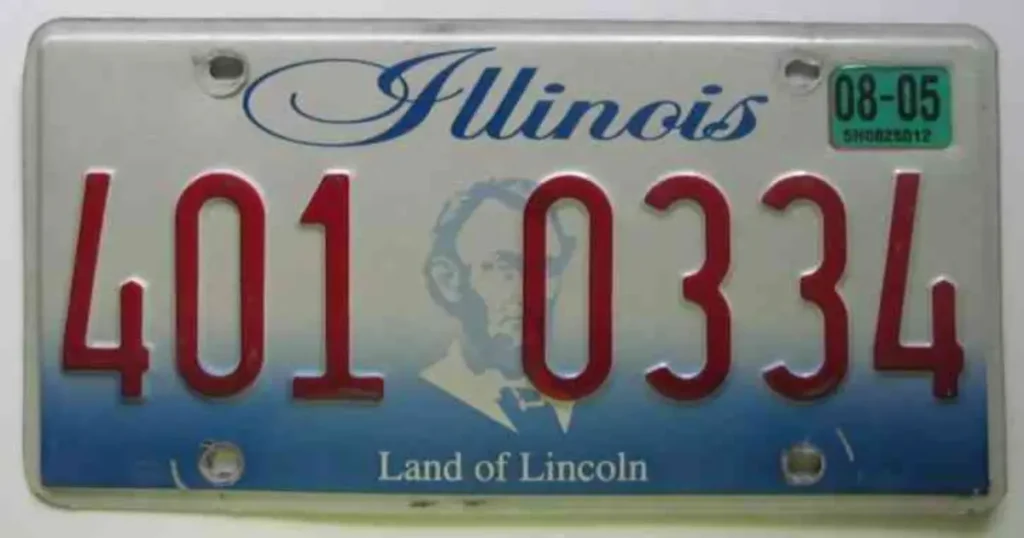The letters F P on a license plate have a specific meaning in Illinois. These letters stand for Fleet Permanent. This designation is used for vehicles of a larger group or fleet, typically owned by businesses or government agencies. The Permanent part indicates that the plate is valid longer than standard plates, often for several years.
Have you ever seen a car with an F P on its license plate and wondered what F P means on an Illinois license plate? You’re not alone! Many people are curious about these unique plates, often seen on trucks, vans, or cars that are part of a company or organization’s fleet.
F P license plates in Illinois are not just for decoration; they serve a practical purpose. These plates make it easier for companies to manage their vehicles. Since the plates are valid for a long time, it reduces the need for frequent renewals. This special designation helps track and administrate large numbers of vehicles more efficiently.
Exploring the Significance of ‘FP’ on Illinois License Plates
Driving through Illinois’s bustling streets and quiet roads, you might have noticed a unique combination of letters on some license plates – ‘FP.’ These two seemingly simple letters carry a distinct significance.
In the world of vehicular identification and regulation. This blog post aims to delve into the fascinating world of Illinois license plates, mainly unraveling the mystery behind the ‘FP’ designation.
The Context of License Plates in Illinois
Illinois, known for its rich history and diverse landscapes, is home to millions of vehicles. Each vehicle carries a license plate – a metal or plastic placard with a unique identifier. License plates in Illinois, as in other states, serve several vital functions:
They identify vehicles for legal purposes, aid in law enforcement, and sometimes even offer a glimpse into the owner’s personality or affiliations through specialty plates.
The Intrigue of ‘FP’ Plates
But among the myriad of numbers and letters, ‘FP’ plates stand out. They spark curiosity and questions: What do these plates represent? Who uses them? Are they common? The ‘FP’ designation is not just a random combination of letters but a code that carries specific meaning within the state’s vehicular regulatory system.
Understanding this code requires a look into the administrative and organizational aspects of vehicle management in Illinois.
Read Also : Do I Need A Front License Plate In Texas?
Deciphering the ‘FP’ Code on Illinois License Plates
As we continue our exploration of Illinois License plates, it’s time to unravel the mystery behind the ‘FP’ designation. These two letters, prominently displayed on certain plates, signify a specific category of vehicles, revealing an organizational system that may go unnoticed by the casual observer.
The Meaning of ‘FP’: Fleet Permanent
In Illinois, ‘FP’ on a license plate stands for Fleet Permanent. This designation is not for your average personal vehicle; it’s reserved for cars part of a fleet. In this context, a fleet refers to a group of vehicles owned or leased by a company, government agency,
or other organizations. The ‘Permanent’ aspect indicates that these plates are issued longer than standard license plates, reducing the administrative burden of frequent renewals.
Who Uses ‘FP’ Plates?
Typically, you’ll find ‘FP’ plates on vehicles that are part of commercial fleets, such as trucks, buses, vans, and cars used for business purposes. These vehicles might belong to large corporations, small businesses,
public utilities, or government departments. The ‘FP’ designation helps quickly identify these vehicles as part of an organized fleet, distinguishing them from personal or other vehicles on the road.
Benefits of ‘FP’ Plates
The use of ‘FP’ plates streamlines the vehicle registration and management process for organizations. It simplifies tracking multiple vehicles and ensures compliance with state vehicle regulations.
This system is particularly beneficial for entities with many cars, as it allows for a more efficient management structure regarding registration, insurance, and regulatory compliance.
The Comprehensive Story Behind ‘FP’ Plates in Illinois
Having understood the meaning of ‘FP’ on Illinois license plates, it’s essential to delve into the broader narrative surrounding them. This part of the discussion takes us into vehicular regulation, fleet management, and how the ‘FP’ designation plays a crucial role in streamlining these processes.
Origins and Implementation of ‘FP’ Plates
The ‘FP’ or Fleet Permanent plates originated as a solution to the logistical challenges faced by organizations with large vehicles. The state of Illinois, recognizing the need for efficient vehicle management,
instituted the ‘FP’ designation to facilitate easier administration for these entities. This system dates back several years and has evolved to adapt to the changing dynamics of fleet management and vehicular regulations.
Eligibility and Application Process
To be eligible for ‘FP’ plates, an organization must meet specific criteria set by the Illinois Secretary of State’s office. These criteria include owning a minimum number of vehicles, having a valid business license, and ensuring all vehicles are adequately insured.
Once these requirements are satisfied, the organization can apply for ‘FP’ plates, which are then issued with a unique numbering sequence that assists in identifying the company and its vehicles.
| Criteria/Steps | Details |
| Eligibility Requirements | |
| Minimum Number of Vehicles | The organization must have a valid business license to operate in Illinois. |
| Valid Business License | The organization must have a valid business license to operate in Illinois. |
| Proof of Liability Insurance | Adequate liability insurance for all vehicles in the fleet must be provided. |
| Application Process | |
| Application Form Submission | Complete and submit the application form for fleet plates. This typically includes company details and vehicle information. |
| Documentation | Submit required documents, such as proof of business license, vehicle ownership, and insurance coverage. |
| Fees | Pay any applicable fees associated with the application and issuance of ‘FP’ plates. |
| Approval and Issuance | Await approval from the Illinois Secretary of State’s office. Upon approval, ‘FP’ plates will be issued to the organization. |
Impact on Fleet Management
The introduction of ‘FP’ plates significantly impacted how companies and government agencies manage their fleets. This system allows for a consolidated registration process, making handling large vehicles more straightforward and less time-consuming. It also aids in regulatory compliance, ensuring that all vehicles in a fleet adhere to state laws and standards.
Advantages for Law Enforcement and Public Safety

‘FP’ plates also have implications for law enforcement and public safety. These plates make it easier for authorities to identify and track vehicles in a specific fleet, especially in traffic violations or accidents. Quickly identifying fleet vehicles can be crucial in emergencies, mainly if they belong to first responders or essential services.
Beyond Illinois: ‘FP’ Plates in Other States
While this discussion focuses on Illinois, it’s worth noting that the concept of fleet plates is not unique to this state. Many other states in the U.S. have similar systems, though the specific designation and criteria might differ.
The common thread is simplifying fleet vehicle management and enhancing regulatory efficiency.
Read More : Does Maryland Require A Front License Plate?
Summing Up: The ‘FP’ Designation on Illinois License Plates

As we conclude our exploration of the ‘FP’ designation on Illinois license plates, it’s clear that these two letters represent much more than just a random combination on a metal plate. They signify a well-thought-out system to streamline fleet management and enhance regulatory compliance.
Key Takeaways
- ‘FP’ Meaning: ‘FP’ stands for Fleet Permanent, indicating that the vehicle is part of an organized fleet, typically owned by a company, government agency, or other organizations.
- Benefits for Organizations: The ‘FP’ system simplifies the management of multiple vehicles for organizations. It reduces administrative efforts, eases regulation compliance, and ensures efficient fleet operation.
- Role in Public Safety and Law Enforcement: These plates assist law enforcement in identifying fleet vehicles, thus aiding in traffic management, accident investigation, and emergency response.
- Broader Implications: The adoption of ‘FP’ plates reflects a commitment to efficient transportation management and public safety, showcasing Illinois’s approach to dealing with the complexities of vehicular regulation.
Frequently Asked Questions
Who can obtain ‘FP’ plates in Illinois?
‘FP’ plates are available to organizations that meet specific criteria, including owning a minimum number of vehicles, having a valid business license, and sufficient insurance coverage.
Are ‘FP’ plates unique to Illinois?
While Illinois uses the ‘FP’ designation, the concept of fleet plates is common across many states, each with its unique system and criteria.
How do ‘FP’ plates benefit fleet management?
They offer a streamlined process for vehicle registration, easier tracking and management, and compliance with state regulations.
Can individual vehicle owners get ‘FP’ plates?
No ‘FP’ plates are reserved for vehicles in an organization’s fleet and unavailable for individual vehicle owners.
Do ‘FP’ plates have any impact on vehicle insurance?
While ‘FP’ plates do not directly affect insurance, fleets typically have different insurance requirements and policies than individual vehicles.
Conclusion
Understanding the ‘FP’ on Illinois license plates is relatively straightforward. It stands for Fleet Permanent, a plate for vehicles part of a business or government fleet. These plates make it easier for companies and organizations to manage their vehicles. They show that the vehicle is part of a larger group, not just a personal car.
The ‘FP’ plates offer a simple way for these organizations to keep track of their vehicles. They also help in following state rules for vehicle registration. For anyone seeing these plates, it’s clear that the car works for a business or government. This knowledge is helpful for the vehicle owners and everyone who shares the road with them.
